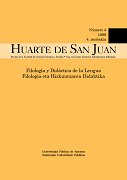¿Por qué se equivocó Etxepare? (notas para una historia de las tecnologías de la escritura)
Keywords:
Basque language, art of printing, language, technoscience, orality, writingAbstract
In 1545 Bernard Etxepare wrote: "The Basques are appreciated the world over, but all the rest have mocked their tongue, for it was not found written on any page. Now shall they learn what a fine thing it is". But Etxepare's prophecy was wrong. When the art of printing arrived, the Basque language didn't "go forth into the world". This was due to technoscientific reasons. This paper analyses the history of these reasons, especially the relation between the orality of the Basque culture and the new technologies of writing.
Downloads
References
ATXAGA, Bernardo (1998), Lista de locos y otros alfabetos. Barcelona, Siruela.
AUSTIN, John L. (1981), Cómo hacer cosas con palabras. Palabras y acciones. Barcelona, Paidós.
BENJMIIN, Walter (1977), "Tesis de filosofía de la historia", in para una crítica de la violencia. Trad. M. A. Sandoval. México, Premia, pp. 109-142.
BRAUDEL, Fernand (1984), Civilización material, economía y capitalismo, siglos XVXVIII. Trad. N. Míguez. Madrid, Alianza.
CARO BAROJA, Julio (1995), Las brujas y su mundo. Madrid, Alianza.
COHEN, I. Bernard (1994), "Lo que 'vio' Colón en 1492", in Nicolás García Tapia (coord.), Historia de la técnica. Barcelona, Prensa Científica, pp. 64-7 1.
CORTÉS, Hernán (1988), Cartas de relación. México, Porrúa.
DIAMOND, Jared (1998), Armas, gérmenes y acero. La sociedad humana y su destino. Trad. F. Chueca. Madrid, Debate.
EIMERIC, Nicolau; y Peña, Francisco (1996), El manual de los inquisidores. Barcelona, Muchnik.
ETXEPARE, Bernard (1995), Linguae Vasconum Primitiae. Bilbao, Euskaltzaindia.
GALILEI, Galileo (1981), El ensayador. Trad. J. M. Revuelta. Buenos Aires, Aguilar.
IDOATE, Florencia (1979), Rincones de la historia de Navarra. Pamplona, Editorial Aramburu.
JAMESON, Frederic (1989), Documentos de cultura, documentos de barbarie, la narrativa como acto socialmente simbólico. Trad. T. Segovia. Madrid, Visor.
LATOUR, Bruno (1998), "Visualización y cognición, pensando con los ojos y con las manos", La balsa de la Medusa, 45/46, 77-1 28.
MACLUHAN, Marshall (1993), Lo galaxia Gutenberg. Génesis del "Homo typographicus ". Barcelona, Círculo de Lectores.
ONG, Walter J. (1996), Oralidad y escritura. Tecnologías de la palabra. México, FCE.
PRESCOTT, William H. (1986), Historia de la conquista del Perú. Madrid, Ediciones Istmo.
REY PASTOR, Julio (1970), La ciencia y la técnica en el descubrimiento de América. Madrid, Espasa Calpe, 4. ed.
RUBERT DE VENTÓS, Xavier (1994), Nacionalismos. El laberinto de la identidad. Madrid, Espasa Calpe.
SAID, Edward W. (1996), Cultura e imperialismo. Trad. N. Catelli. Barcelona, Anagrama.
SÁNCHEZ FERLOSIO, Rafael (1994), Esas Yndias equivocadas y malditas. Barcelona, Destino.
SCHMITT, Carl (1985), La dictadura. Madrid, Alianza.
SEARLE, John (1986), Actos de habla. Madrid, Cátedra.
SUBIRATS, Eduardo (1994), El continente vacío. La conquista del Nuevo Mundo y la conciencia moderna. Madrid, Anaya/Mario Muchnik.
VIDEGÁIN AGÓS, Fernando (1992), Navarra en la noche de las brujas. Pamplona, Gobierno de Navarra.
WEBER, Max (1991), ¿Qué es la burocracia? Trad. R Arar. Buenos Aires, Leviatán.
Downloads
Published
How to Cite
Issue
Section
License
All articles are published under a Creative Commons (BY-NC-ND 4.0) license. Each article will be assigned a DOI.
Authors retain copyright of their work and grant the journal the right to the first publication. Authors can sign additional agreements to non-exclusive distribution of the published version of the article (for example, in an institutional repository) as long as appropriate attribution to the original publication is provided. Articles can be uploaded to institutional repositories immediately after publication.
Electronic distribution of the articles (for example, academic social networks or personal webpages) is allowed and encouraged.
The journal reserves the right to publicise the work in social networks and other electronic means.







